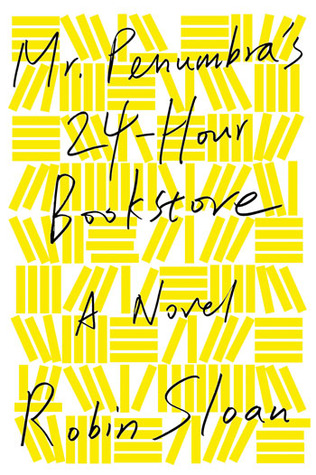(The cover glows in the dark! I discovered this fact quite by accident.)
This is not a new book; it's from 2012. But somehow I had never heard of it until I pulled a used copy out of a local neighborhood's little free library and took it home. And it was fabulous! Seriously, this is the BEST book I've read in quite some time. It's just so layered and so clever that I had to keep re-reading parts to catch the subtleties. (And I probably will read the whole thing again to catch even more.)
Basically, Sloan has taken the idea of an epic tale, removed the magic, and written a book set in a modern world but with an epic plot structure. Mysterious group of people dating back hundreds of years? Check. A quest? Check. An old man/mentor who knows far more than he tells? Check. An evil ruler with great power over many? Check. A journey to the Underworld? Check. A protagonist who does not realize his own abilities until they have been tested? Check. Faithful companions who have their own reasons for the quest? Check. A mysterious object? Check. It's all there, people.
Sloan took some real historical figures -- Aldus Manutius, a Venetian printer, and Francesco Griffo, whom Sloan recasts as Griffo Geritzoon, the actual inventor of the italic typefont -- and he creates a mystery surrounding what they did. It's encoded in an ancient book, and Mr. Penumbra's bookstore holds a library of people's attempts to find the message, which supposedly holds the key to eternal life.
Since so many reviews have already been written about this book, I'm going to skip the plot summary and just dive straight into refuting the negative reviews.
Zip Dementia on Amazon claims the characters aren't developed.
"Dementia" may be correct for this reviewer. Clay, Neel, Kat, Igor, Penumbra, Deckle, Corvina -- even the super-minor characters like Tabitha and Daphne -- all have wants, needs, and goals. Each works perfectly into the plot. Seriously, did this reviewer even bother to connect the name Penumbra with its meaning?
Multiple reviewers claim that Clay, the protagonist, has no personality.
Of them I ask, "Did you finish reading the book?" How did you not notice that Clay is humble and believes he's nothing special, even though everyone else can see it? Are you too stupid to grasp a character's personality when the book is told in 1st person POV? Or do you need a 3rd person narrator to tell you everything? Have you ever heard of "show; don't tell"?
Multiple reviewers seem to think there's too much Google in the book.
OK. But the internet takes the place of magic in this tale. And Clay's visits to Google -- the place of wonder, where the employees are all treated incredibly well and where so many brilliant minds work together to do amazing things -- is much like Frodo's visit to Lothlorian, or Lancelot's trip to Camelot, or -- you get the picture.
And Google is the perfect modern method for finding answers, the answers that are escaping the members of our quest.
Maria Korchagin on Amazon says the book is "unresearched."
Really? I suspect it is she who hasn't done her research, especially since she gives not one example of a mistake supposedly made by Sloan. Perhaps if she'd taken the time to look up a few names, she'd have learned how much Sloan put into this tale.
Numerous reviewers refer to this as a mystery.
Um, no. It's a fantasy tale minus the magic. There's no crime. It's a puzzle to solve.
One goodreads reviewer claimed the romance isn't romantic.
Clay, the protagonist, treats his preferred lover Kat with respect, giving her choices and the space to put work first when she needs to do so. Maybe that's not romantic, but it's decent and considerate and feminist. I'll take it.
Several reviewers claim they don't know much about computers, so this book isn't "for" them.
Good heaven, people, I'm an English teacher, and yet I grasped the computer-ish parts of this book just fine! You don't have to know how to code in order to understand what happens here. And remember: the internet and Google are the "magic" in this book. They are the awesome and profound powers that help to provide conflict and resolution in the plot.
This is a fantastic book. It's one I intend to read over and over. Still, it's probably not for everyone.
If you like fantasy stories, this is your book. If you loved role-playing games back in the day when they weren't online, if you know creative people who make things and have vivid imaginations, this is your book.
If you want a mystery, however, or a bodice-ripper, this is NOT your book.
That being said, I'd give it more than five stars if I could.

No comments:
Post a Comment